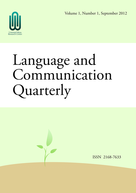


Volume 13 Issues 1-2 (2024-06-30)
Volume 10 Issues 1-4 (2021-12-31)
Volume 9 Issues 1-4 (2020-12-31)
Volume 8 Issues 1&2 (2019-06-30)
Volume 7 Issues 3&4 (2018-12-31)
Volume 7 Issues 1&2 (2018-06-30)
Volume 6 Issues 3&4 (2017-12-31)
Volume 6 Issues 1&2 (2017-06-30)
Volume 5 Issues 3&4 (2016-12-31)
Volume 5 Issues 1&2 (2016-06-30)
Volume 4 Issues 3&4 (2015-12-31)
The Editor-in-Chief is proud to announce the inaugural issue of Language and Communication Quarterly, published by Untested Ideas Research Center, Niagara Falls, New York, USA.
Using generalizability theory as a theoretical framework, this study investigated the impact of raters’ educational background on the assessment of K-12 ESL students’ writing. Twenty teacher candidates (ten TESOL majors and ten non-TESOL majors) from universities in western New York and southern Ontario participated in this study. The 20 participants were asked to rate three ESL essays holistically on a 1-10 point scale (1 being the lowest and 10 being the highest with permission to use half points). The results indicate that raters’ TESOL-related educational background did impact their rating of ESL essays. The TESOL teacher candidates marked the three ESL essays more consistently and reliably than their non-TESOL counterparts. Important implications are discussed.
Langacker (1991) technically defines topic as a kind of “subjective reference pointâ€, where “subjective†roughly refers to the maximized observer’s role or the minimized role as object or observation of the topic entity. While this definition successfully captures the dynamic aspect and cognitive salience of topic, it is based more on reasoning than on naturally occurring language data. This paper presents some practical work concerning Beijing Mandarin, i.e., Mandarin spoken by Beijing locals, with a view to arguing that topic may function as objective as well as subjective reference point in discourse use. Given the wide variety of topic expressions in this topic-prominent language, it is highly probable for some topics not to refer their respective comments in the subjective manner, especially when the topic entity and its target entity in a topic-comment construction manifest such objective relationship as possessor-possessed, part-whole, etc. In addition, the semantics of some topic types and the accessibility of the topic entity may impose further constraint on the speaker’s choice of conceptual reference point.
Previous entertainment media research has mainly focused on media’s pleasure-giving appeal while neglecting other psychological aspects that transform the perspectives of the audience. Shrum has developed groundbreaking studies in this overlooked area by deconstructing the delicious paradox of entertainment media. This paradox incorporates media’s delivering of pleasure and enjoyment while simultaneously promoting and persuading the audience through embedded messages. The present article employs Dynamic System Theory (DST) to examine the paradoxical nature of entertainment media, which blurs the lines between message and invisible persuasion and is the central theme of Shrum’s body of research.
This study seeks to explicate the relationships among sex, gender and attachment. Attachment theory (e.g., Bowlby, 1969) posits that unique attachment styles develop based on experiences with primary caregiver(s). These attachment styles (e.g., secure, preoccupied, dismissing, and fearful) are enduring, and come to define attachment in adult romantic relationships (Bartholomew & Horowitz, 1991; Hazan & Shaver, 1987). Biological, evolutionary and socialization theoretical approaches exist regarding the relationship among sex, gender and attachment. Explicating the possible nature of those relationships is important for communication research, particularly research that explicates sex and gender differences in romantic attachment.
1ST Untested Ideas International Research Conference
June 28 – 30, 2013
Niagara Falls, USA
Untested Ideas (UI) Research Center is announcing a CALL FOR BOOK EDITORS to its 1st international research conference on June 28-30, 2013. The conference is being held in downtown Niagara Falls, USA.
UI RESEARCH GRANTS PROGRAMS
UI Research Center is announcing its 2013 Research Grants Programs (UI Research Grants for New Scholars and UI Research Grants for Doctoral Students). Grants will be awarded directly to the selected recipients at the opening ceremony of the 1st UI International Research Conference on June 28, 2013.